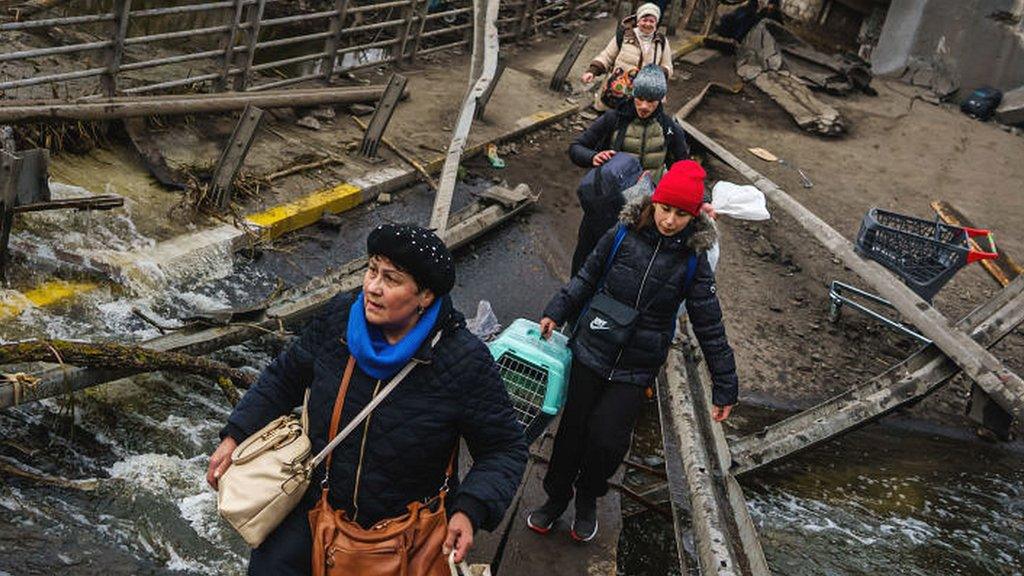Ukraine conflict: Your guide to understanding day 12
- Published
Jeremy Bowen was on the frontline in Irpin as residents came under Russian fire while trying to flee
On day 12 of the invasion, there was no let-up in the Russian shelling of major population centres, despite a proposal from Moscow to create safe escape routes.
Mariupol, Volnovakha, Sumy and Kharkiv spent another day under fierce attack, which prevented the evacuation of civilians, said Ukraine's foreign ministry.
Russia said earlier that humanitarian corridors would allow people to leave some of the threatened areas.
But Ukraine branded the proposal "immoral" after it emerged many of the routes would only take civilians to Russia or its ally, Belarus.
It urged all countries to put pressure on Moscow for a ceasefire.
The mayor of Irpin, a beleaguered town on the north-western outskirts of Kyiv, said 1,000 people had been taken to safety. He said Ukrainian forces had repelled Russian attacks and they had pulled back.
Residents of Irpin have been fleeing the Russian assault on their city, which is half an hour's drive from the capital.
You can read Orla Guerin's account of their struggle here.
The Ukrainians said other towns in the area, including Bucha and Hostomel, were in Russian hands and the situation was critical.
Rescue workers say at least 13 people were killed when an air strike hit an industrial bakery west of the capital, Kyiv.


Angry Zelensky vows to punish Russian atrocities
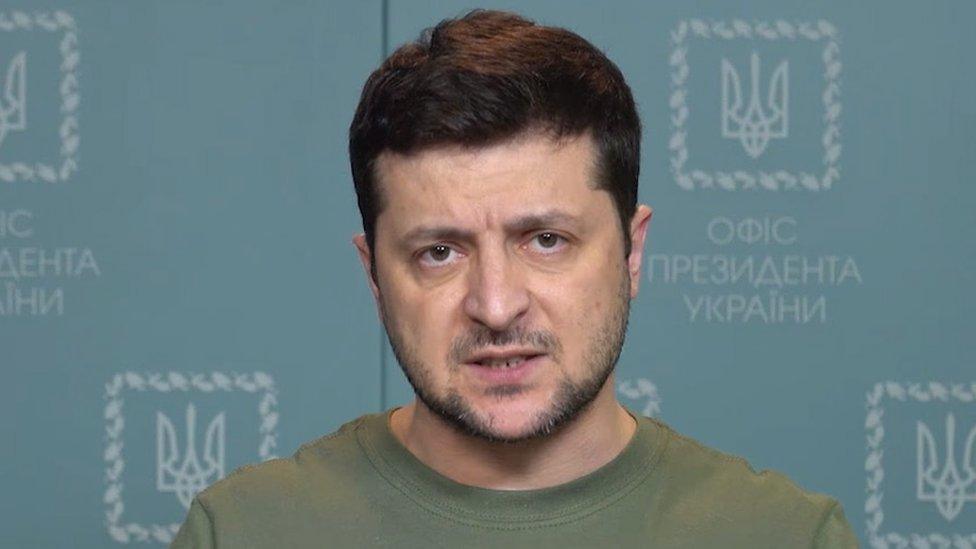
Ukrainian President Volodymyr Zelensky has said everyone who commits atrocities against Ukraine's civilians will be punished.
He said Ukrainians would not forgive or forget and accused invading Russian troops of deliberate murder.
"There will be no quiet place on Earth for you. Except for the grave," the president said.
Ukrainian officials say Russia is striking civilian targets around the country, including hospitals, nurseries and schools.
But Russia denies targeting civilians, saying it is carrying out a "special military operation" against Ukrainian "nationalists" and "neo-Nazis".
Meanwhile, delegations from Russia and Ukraine have held a third round of talks in Belarus with little progress.
Contacts between the two sides have so far come to nothing, with Russia insisting it will only stop the invasion if Ukraine meets all its demands.

Chernobyl workers' 12-day ordeal under Russian guard
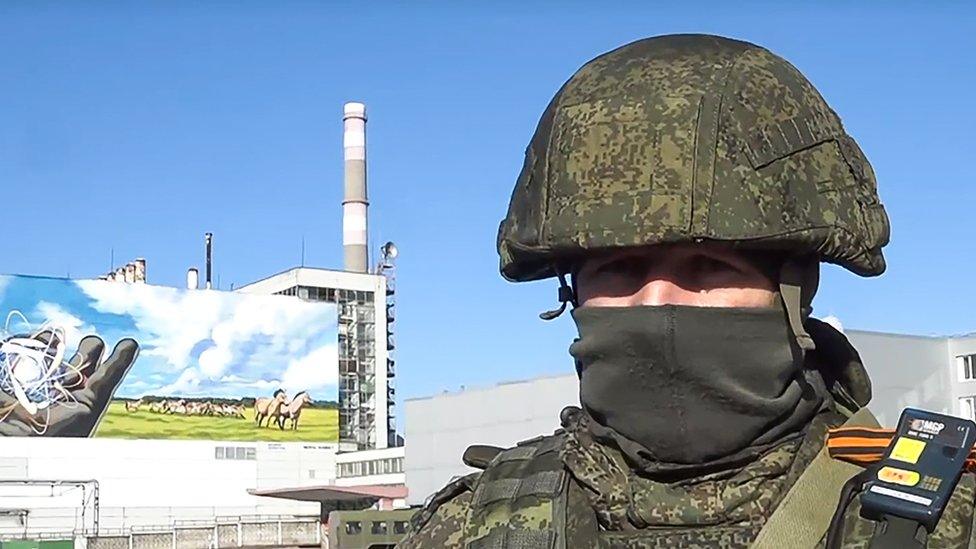
Russian troops have surrounded the perimeter of the plant
More than 100 workers at Ukraine's Chernobyl nuclear power plant - the site of the world's worst nuclear disaster in 1986 - have been stuck there for more than 12 days, unable to leave after Russian forces seized the plant on the first day of the invasion.
Another 200 Ukrainian guards, who'd been in charge of security at the time of the assault, also remain trapped.
Workers continue to go about their duties and the atmosphere is said to be calm, but the BBC has been told that the conditions inside are difficult, with food and medicine limited.

'I never thought I would leave my home like this'
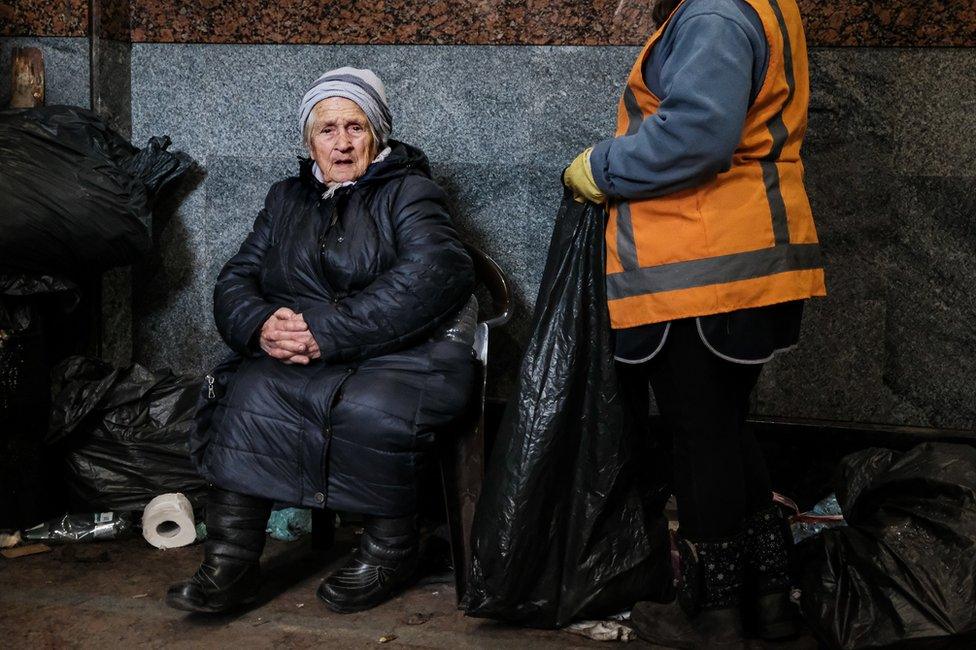
Dusia Kostiuk, 91, travelled from Kharkiv to Lviv on her way to Poland
Despite the fierce fighting, huge numbers of Ukrainians are on the move.
The western city of Lviv has reached the limit of its capacity to help refugees displaced by the Russian invasion, its mayor, Andriy Sadoviy, said on Monday.
Hundreds of thousands of displaced people have flowed into Lviv since the invasion began, putting a huge strain on the city's resources.
Among them was 91-year-old Dusia Kostiuk, who spent 27 hours on a train from the heavily bombed city of Kharkiv.
"Our house was still there when we left but shelling was happening all around and we were told that terrible shelling is happening there now," she told the BBC's Joel Gunter.
"We didn't take anything with us, I took two dresses and that's it.
"I was born and raised in Kharkiv. I didn't really travel before, I don't like to travel. I never thought I would leave my home like this."

Ukraine's growing refugee exodus
Watch: The children with cancer fleeing war in Ukraine
More than 1.7 million Ukrainians have so far fled the war-torn country,
The vast majority of them - more than one million - are heading to neighbouring Poland.
Others are crossing to neighbouring countries to the west, such as Romania, Slovakia, Hungary and Moldova.
Among the refugees are Ukrainian children with cancer. They are being evacuated by non-governmental organization Herosi, co-ordinated by the US-based St Jude Children's Research Hospital.
Efforts are under way to find the patients places in medical care centres across Europe.

Why has 'Z' become a Russian pro-war symbol?

Russian gymnast Ivan Kuliak is facing disciplinary proceedings by the International Gymnastics Federation (FIG) for displaying the letter "Z" on the podium next to a Ukrainian rival in Qatar. But what does the symbol mean?
In Russia, the "Z" is fast becoming seen as a staunchly pro-war symbol of President Putin's invasion of Ukraine.
It has been sported by politicians, seen on the sides of cars, vans and advertising hoardings - as well as daubed on bus shelters. It has even been used by Serbs at pro-Russian demonstration in Belgrade. Photographs have been widely shared on social media.

Oil price highest for more than a decade
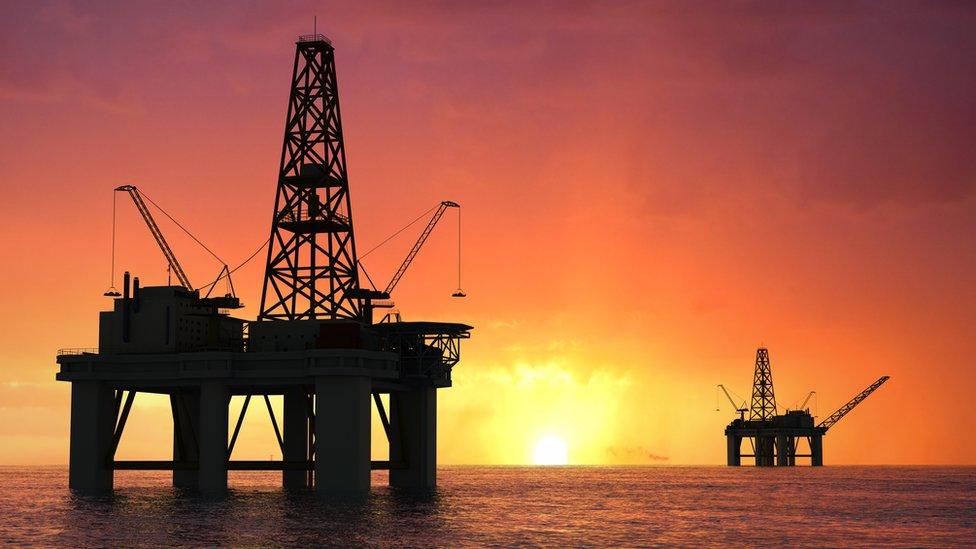
On the global financial markets, the impact of the war is still being felt.
Oil and gas costs have been soaring amid fears of a global economic shock from Russia's invasion of Ukraine.
Oil jumped to $139 (£106) a barrel at one point on Monday, the highest level for almost 14 years, while wholesale gas prices for next-day delivery more than doubled.
The price surge came as the US hinted at a ban on buying Russian energy, with other countries urged to increase supplies.
However, not all EU countries are ready to enforce such a ban.
Big powers Germany and Italy - far more reliant on Russian energy than most - feel more threatened by the prospect of skyrocketing energy prices that would surely follow any sanctions on Russian oil or gas imports, as the BBC's Katya Adler reports.

War in Ukraine: More coverage
IN KYIV: Locals fear another Grozny or Aleppo
ANALYSIS: Europe finally steps up
EXPLAINED: Why Putin has invaded Ukraine?
IN DEPTH: Full coverage of the conflict

Related topics
- Published7 March 2022
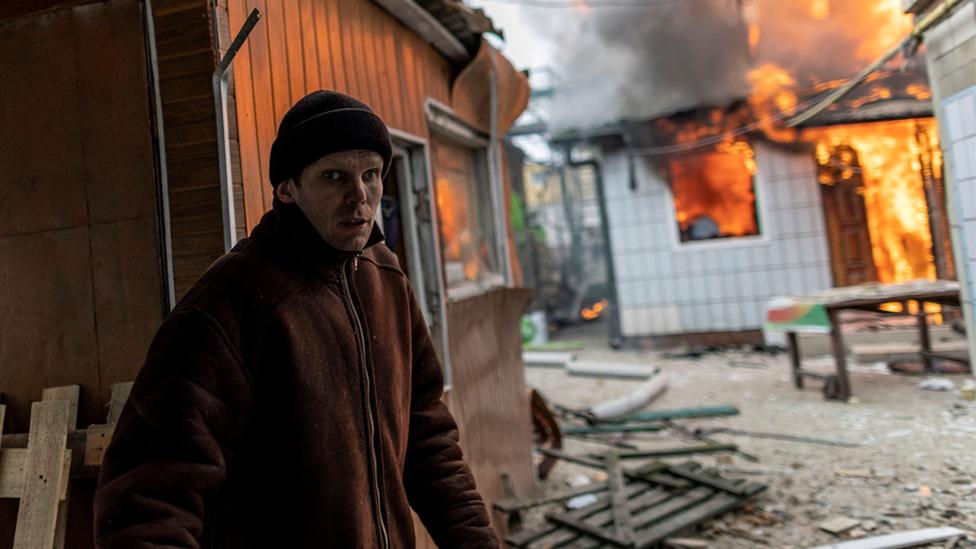
- Published6 March 2022
